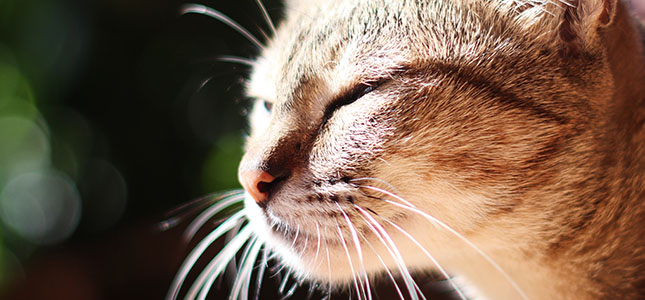
How to Manage Grief: Ways to Cope When Your Pet is Dying
By Kathryn Jennings, M.A. | Grief Counseling, CPLP, CPFE
President & Founder, Day By Day Pet Caregiver Support
A pet’s terminal illness or death is an extremely difficult time filled with great sadness for owners. Whether your pet dies suddenly or after grappling with a disease for a period of time, it’s always challenging to cope with the news. Seeking help and speaking to others can make things better during that time. It’s also beneficial to take time for yourself and process your feelings during this experience. We’re offering some recommendations for how to get through your pet’s illness and death that can help you during this difficult period of grieving a pet.
If someone has a severely sick pet that may pass away, what are some ways to cope during that difficult time?
Anticipatory grief is a common type of grief that starts before loss occurs, most often when a parent knows death is imminent. As a pet parent, your time is consumed by caregiving for the sick pet and it can often be easy to forget about yourself. It’s truly necessary to take the time to care for yourself and isolation can be a first “go to” during which you let yourself experience your own emotions. After that, connecting with others who understand your pain will help you feel understood. Seeking out those walking the same road as you or speaking to a pet loss professional are just some of the options available to you.
Communicating closely with your vet team is so important to help pet families cope with making treatment and difficult end-of-life decisions, as you continue to care for you ill or aged pet. The more information you have, the better prepared you are to make decisions that are necessary and appropriate for both your pet and yourself.
How can a pet owner best support their pet during that time?
Providing hospice and palliative care can be an option during this time depending on the pet’s quality of life. Living in the moment with your pet is vital for him/her as well as yourself. Preparing a bucket list of your pet’s favorite things to do or places to go can provide some additional joy for both you and your pet. Pets live in the moment so whatever you can provide in regards to physical comfort and love will be what benefits your pet most.
Are there ways to mentally prepare for a pet’s death?
Whether a pet dies naturally, tragically or through intervention, it is always difficult to truly “prepare” oneself. When a pet dies naturally (expected or not expected) it can be shock that can with little to no warning. Tragic losses can be extremely hard to bear as they too come with warning and can be terribly disturbing to witness. And finally, a loss through the intervention of humane euthanasia can be the hardest decision a pet family is ever faced with. Euthanasia is defined as a peaceful death to end suffering but the end of life journey can be riddled with tremendous emotions. Making an end-of-life decision becomes the next necessary and needed step despite our desire to want to control the outcome. The option of euthanasia (when circumstances are available) provide families with the ability to plan ahead for who they want to present, where it will take place (in the home or veterinary office) and it allows for a family to provide as peace-filled passing as possible.
What are some ways to soften the pain after a pet dies?
When one loses a beloved pet, we become bereaved, torn apart from who we love. Once bereaved, we then can experience grief, the inward pain of loss. Our grief must have an outlet to be expressed which is why mourning, the outward expression of grief, is so vital to one’s journey.
The pain of grief will soften over time through the hard work of mourning. The pain of grief can range from mild to intense depending on the relationship a family had with his or her pet. Finding ways to touch the pain and be companioned on the journey is vital. Allowing oneself to mourn openly with others who can provide empathy and understanding allows families to release their grief in a safe, non-judgmental space.
In grieving a pet, pet parents are compromised emotionally, physically, cognitively and even spiritually. Caring for oneself and finding a support network can provide comfort through the pain. Rituals can also help you move from the initial thoughts of the final days/moments to the peaceful thoughts and memories of the life and love you shared together.
What’s it like to attend a pet support loss group at MVA?
Pet loss support groups are designed to allow for mourning within a group of empathetic supporters. When we connect with others walking a similar road, we find understanding and empathy for the feelings and pain we are experiencing. We truly see we are not alone. Lending and receiving support in an environment that is safe and non-judgmental can be very beneficial for families grieving a pet.
Everyone grieves differently but what are some of the feelings pet owners go through?
Pet parents/families can be faced with a wide range of emotions such as sadness, anger, depression, guilt/regrets, and even moments of acceptance that ebb and flow for weeks or even months after loss. The emotions can make you feel out of control and even abnormal as if they are not handling their loss in a healthy way. This is the way of grief.
A reliving of the details after loss and questioning what occurred throughout his or her life and especially at the end-of-life is indicative of a grief journey. The “What If” questions can range from how much you did or did not do medically for your pet, how much time you spent with your pet and whether you did all you could at the end, are familiar questions most families ask themselves.
No one should ever need to apologize or be judged by what he or she is experiencing or have it ranked against other losses. Your grief is your grief and it deserves the care and attention of anyone who is experiencing a loss.
What advice do you have for someone who feels like their pain won’t go away?
The goal of support is that grief will soften over time. If a pet parent does not believe his or her grief journey has lessened in intensity then it is reasonable to suggest individual grief counseling. Sometimes in grieving a pet, it’s hard to feel the progress we’ve made over time. Life’s circumstances and complicated/compounded grief can make moving through your grief journey more challenging. While there’s no timetable to grieving a pet, it’s important that a person is able to continue daily activities as best he or she can. Don’t let grief become the main focus of your existence. Be proactive about finding ways to bring joy back into your life and doing things you enjoy. Allowing yourself to have fun or relax doesn’t mean you miss your pet any less. It only means that you’re taking care of yourself through your heartache, and that’s healthy.
Ask A Question
It’s important that our patients and their families can get to know our doctors and the facility. Ask us a question about anything for a chance to see it answered on our blog.
"*" indicates required fields
